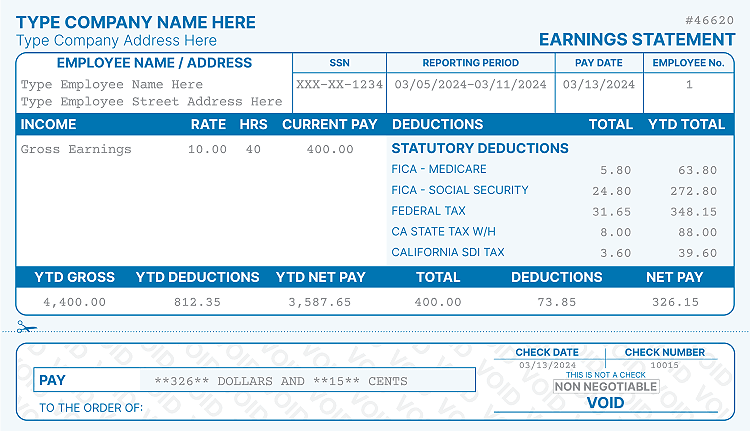Guide to Pay Stub Requirements by State
What requirements do you have to keep in mind when creating paystubs for employees? Federal? Local? The answer to that question depends on where your business operates.
Pay stub requirements vary from state to state. While some parts of the US have very particular legal instructions about what to feature on such documents, other parts of the country give employers a bit more freedom. It’s imperative to check local regulations if you don’t want to experience issues down the line.
In this article, we’ll cover all of the essential topics, including:
Is There a Particular Way to Fill Out a Paystub?
Are Employers Obliged to Provide a Paystub
State by State Pay Statement Requirements
State by State Pay Statement Requirements
Opt-In vs. Opt-Out States: What’s the Difference?
Pay Stub Requirements by State: The Cost of Non-Compliance
How to Produce Paystubs That Meet All Legal Requirements
The Basics: What’s a Paystub
A pay stub is an official document that outlines essential information about a pay period. Usually, paycheck stubs have to list details like:
-
Gross wages
-
Year-to-date earnings
-
Tax deductions and employer contributions
-
Net pay
Paycheck stubs can be generated via dedicated software. Lots of the information will be filled out automatically and key calculations will also be simplified when you choose the right platform. Relying on such software reduces the risk of errors but you have to make sure that the specific platform you’re using accounts for local legal requirements.
Is There a Particular Way to Fill Out a Paystub?
As already mentioned, you can count on software to generate your paystubs. Most of these platforms provide standardized templates and fields, allowing you to enter all of the important information. You can also use this step-by-step guide to create a paystub.
Every employer will need to gather certain types of data before filling out a paystub. Some of the essentials include:
-
An employee’s Form W-4
-
Payroll cycle data
-
Gross pay and net pay for each of the employees
-
Tax withholdings, both federal and state
-
Benefits withholding amounts for each employee
Are Employers Obliged to Provide a Paystub
To answer this question, we have to take a look at two legal frameworks – the federal and the state one.
Federal Requirements
There is no federal law requiring paystub issuing from employers. The only legal document that may apply on the federal level is the Fair Labor Standards Act (FLSA). As per this act, employers have to keep employee time and pay records.
Federal regulations don’t extend beyond this recommendation. Those who need additional guidance should take a look at pay stub requirements by state.
State by State Pay Statement Requirements
Here’s where things may get a little bit more complicated.
Pay stub requirements by state vary. There are also some discrepancies pertaining to what information is required on a pay stub. In some parts of the US, employers have to hand out printed paystubs. In others, a digital copy is enough.
The paystub requirements by state fall under three categories:
-
Places that have no requirements
-
Access states
-
Access/print states
Read: Paystub Guide
Let’s take a more detailed look at the three categories and the states that fall under each one.
State by State Pay Statement Requirements
One thing to keep in mind is that even if a state doesn’t have paystub requirements, it’s still a good idea to issue such documents for each pay period. Not only are paycheck stubs beneficial for employees, they can also enhance record-keeping and have a positive impact on a company’s reputation.
As far as legal requirements go, states are classified in one of three categories.
No Requirement States
As the name suggests, these are the states that don’t have a legal requirement for the issuing of paystubs or the provision of those in either printed nor digital form.
The no requirement states include:
-
Alabama
-
Arkansas
-
Florida
-
Georgia
-
Louisiana
-
Mississippi
-
Ohio
-
South Dakota
-
Tennessee
Thus, if you’re wondering about Florida pay stub requirements, there aren’t such. You can still go through with paycheck stub creation but there’s no legal mandate. Also, it’s up to you to decide what kind of information you’re going to feature in the paystub.
Access States
The term “access state” refers to parts of the US that oblige employers to give employees access to a paystub. In this instance, there’s no legal requirement for the paystub to be made available in print form. A digital file will be enough to ensure compliance.
As of 2023, the access states include:
-
Alaska
-
Arizona
-
Idaho
-
Illinois
-
Indiana
-
Kansas
-
Kentucky
-
Maryland
-
Michigan
-
Missouri
-
Montana
-
Nebraska
-
Nevada
-
New Hampshire
-
New Jersey
-
New York
-
North Dakota
-
Oklahoma
-
Pennsylvania
-
Rhode Island
-
South Carolina
-
Utah
-
Virginia
-
West Virginia
-
Wisconsin
-
Wyoming
Access/Print States
You’ve probably guessed already that these states don’t just ask employers to give employees access to a paystub. The document has to be printed out and handed to mark each pay period. The list of access/print states includes:
-
California
-
Colorado
-
Connecticut
-
Iowa
-
Maine
-
Massachusetts
-
New Mexico
-
North Carolina
-
Texas
-
Vermont
-
Washington
-
Opt-out states
Opt-In vs. Opt-Out States: What’s the Difference?
When talking about state paystub legal requirements, there’s one more classification in need of being mentioned – opt-in vs. opt-out states.
What Are Opt-In States?
Legally speaking, employers operating in opt-in states have to offer a printed copy of a paystub for each pay period, unless an employee specifically request getting a digital version of the document.
As of now, Hawaii is the only part of the US that is classified as an opt-in state.
What Are Opt-Out States?
The term opt-out states refers to parts of the US where employees can opt out of digital paystubs and ask for printed copies instead. Usually, these requirements affect companies that decide to roll out paperless documentation programs.
There are only 3 opt-out states:
-
Delaware
-
Minnesota
-
Oregon
In these places, even if companies prefer to prioritize digitization, they will still have to comply with an employee’s wish to maintain paper-based records.
Pay Stub Requirements by State: The Cost of Non-Compliance
Compliance comes in two forms – issuing a paystub that’s provided in a particular way and also making sure that the paystub contains all of the information required by law.
As far as the content of paystubs goes, there are variations from one state to another.
For example, California pay statement requirements include:
-
Pay period specifics (start and end dates)
-
Employee’s personal details (name, last four digits of social security number)
-
Company information (name and address)
-
Gross wage
-
Number of hours worked (for employees who are getting paid on an hourly basis)
-
Mandatory and voluntary deductions
-
Net wages
Massachusetts, on the other hand, has much more minimalist requirements:
-
Employer name
-
Employee name
-
Pay period dates
-
Number of hours worked (if applicable)
-
Pay rate
-
Wage deductions
There’s still a third instance in which the requirements are very vague and open to interpretation. North Carolina pay stub requirements don’t go into any detail apart from asking employers to provide employees with a statement of deductions from employee wages.
So, what would happen if you don’t comply with the state law on pay stub issuing?
Once again, the answer is location-based. States have the right to apply fines and penalties to the employers who violate paystub legislative requirements.
In New York, for example, the fines could be as significant as 250 dollars per day per employee for a failure to issue a paystub. In California, the failure to issue paystubs is a misdemeanor and there’s an added civil penalty.
Employees can also seek damages if they haven’t been provided with paystubs. They also have the right to pursue compensation for paystubs that come with incomplete or inaccurate information.
How to Produce Paystubs That Meet All Legal Requirements
Now that you know what information is required on a paystub, you can come up with the best method for the accurate generation of such documents.
Using a paystub generator can really simplify the process but there are still some tricky things to pay attention to. The available templates and fields should provide an opportunity to outline all of the details and the numbers that are legally required.
As paystub data requirements vary from state to state (and these could also change periodically), it’s crucial to familiarize yourself with local laws that outline the details. If you’re not confident about the essentials to feature, do consult an accountant or a payroll professional. A legal consultation can also come in handy, especially if you’re worried about handling paystub generation incorrectly in the past.
Paystub requirements by the state also dictate how such documents are going to be distributed among employees. Not giving access to the right information in the correct format can lead to issues down the line. Thus, the generator you count on can produce nice digital copies, as well as paystubs that appear well-organized and easy to print.
To create paystubs that meet all legal requirements, you may want to follow these simple steps:
-
Find out what kinds of information you have to feature on a paystub
-
Check out the demo version of several generators, and make sure they can list all essential details on the document
-
Look for a paystub generator that also automates some of the calculations (or imports data from payroll software) to reduce the risk of errors – remember there are penalties for the inclusion of wrong information in a paystub
-
Be meticulous, create paystubs for each pay period and deliver those to employees in the correct format
The best practice is to issue and distribute paystubs even if these aren’t required by law. While getting started with those takes some time and you’ll probably have to go through a learning curve, meticulous documentation always pays off.
Your employees have the right to receive the information that relates to their payments and taxes. Making sure such documents are issued, even if you’re not legally obliged to go through the process, will inevitably have a profoundly positive effect on your reputation.
Kristen Larson is a payroll specialist with over 10 years of experience in the field. She received her Bachelor's degree in Business Administration from the University of Minnesota. Kristen has dedicated her career to helping organizations effectively manage their payroll processes with Real Check Stubs.

